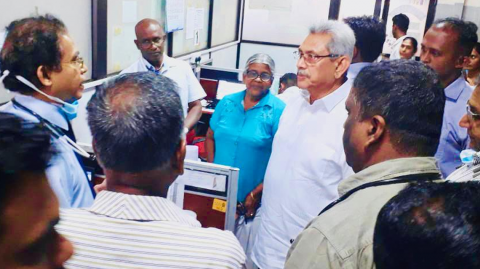
President Gotabaya Rajapaksa made a sudden observational visit to the National Hospital in Colombo, today (09).
The President visited the OPD building complex of the National Hospital and inquired about the activities at the OPD while engaging in cordial discussions with the patients.
President Rajapaksa asked patients regarding their villages where they came from and inquired about the reasons for travelling such long distances.
Those patients apprised the President regarding the prevailing issues at the hospitals located out of Colombo.
During this visit, the President discussed the issues at the National Hospital with the Doctors and the staff of the Hospital.
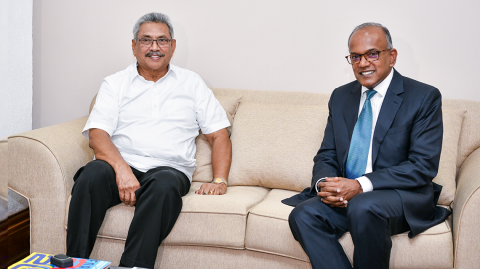
Singapore Law and Home Affairs Minister Kasiviswanathan Shanmugam who was on a three-day official visit to Sri Lanka called on President Gotabaya Rajapaksa at the today (8). President and Minister Shanmugam broadly discussed on a range of issues of importance to the two countries.
The discussions that took place at the Presidential Secretariat mainly centered on improving bilateral relations in areas of trade and investment. They also touched on regional concerns, especially in terms of countering terrorism, cyber security, curbing extremism, threats from foreign influences and interferences and improving intelligence.
They also discussed on the new legislations introduced by Singapore to address hate speech, online disinformation and the Maintenance of Religious Harmony Act. The talks also focused on Social Media Intelligence models that businesses are increasingly relying on for data management, which is crucial for business development, functioning and promotion. New technologies that Singapore is currently exploring in terms of Irrefutable Identification that combines both fields of digital and biometric also came up in the discussions.
After the conclusion of the cordial talks, President Rajapaksa hosted Minister Shanmugam for lunch at the President Secretariat, after which the Minister left for the Katunayaka International Airport.
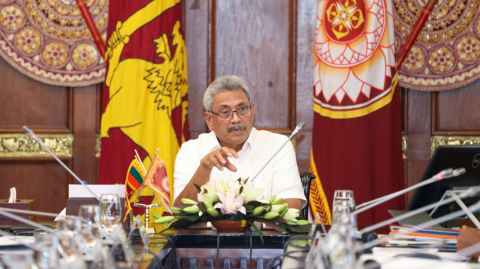
- Conformity Certificate in a day
- Long-term loan and concessionary interest rates when purchasing houses for the first time
- Waste management in Colombo suburbs in a systematic manner
- Beautification of small cities around the country
- Expedite Weras Ganga project
President Gotabaya Rajapaksa directed officials to grant approval for properly prepared housing and small-scale business construction plans within a day.
Rigid regulations and time consuming process of approving construction plans pose great difficulties to the public.
Hence, it is a responsibility of the government to minimize the hardships faced by the people by simplifying existing rules and regulations said President Rajapaksa during a meeting with the officials of the entities which come under the purview of the Ministry of Urban Development, Water Supply and Housing Facilities held at the Presidential Secretariat today (06).
The President advised to authorize local authorities to approve plans and to pay attention to expedite the preparation of related provisions by other institutes.
President also directed that an official with a legal background be appointed to grant approval plans in the waiting list and issuing Conformity Certificate in a day was made mandatory.
The necessity of granting loans at a concessionary rate with a long re-payment period for those who are purchasing a house for the first time was also discussed.
President highlighted the importance of identifying investment opportunities available in each province and area and to obtain approval from government institutes and take steps to inform the same to the Board of Investments.
This process will encourage the foreign investors and give them the opportunity to commence their projects without undue delays.
Beautification of small cities around the country will attract more tourists President said. Cities such as Thalawakele, Ella and Ginigathhena were cited as examples and steps to be taken to modify them were also discussed.
President also directed to expedite Weras Ganga project.
During the discussion special attention was drawn to waste management.
President told the relevant officials to take steps to transform waste into organic fertilizer and to use technology to the maximum during the process.
President pointed out the possibility of reducing the sand prices by removing accumulated sand deposits with the assistance of Geological Survey and Mines Bureau. This will also be instrumental in providing solutions to the issue of floods in many parts of the country.
It was also decided to commence the Beira Lake purification project and to immediately close down identified areas where waste is being added to the lake .
Ministers Gamini Lokuge, Indika Anuruddha, Secretary to the Ministry and several other officials were also present at the discussion.
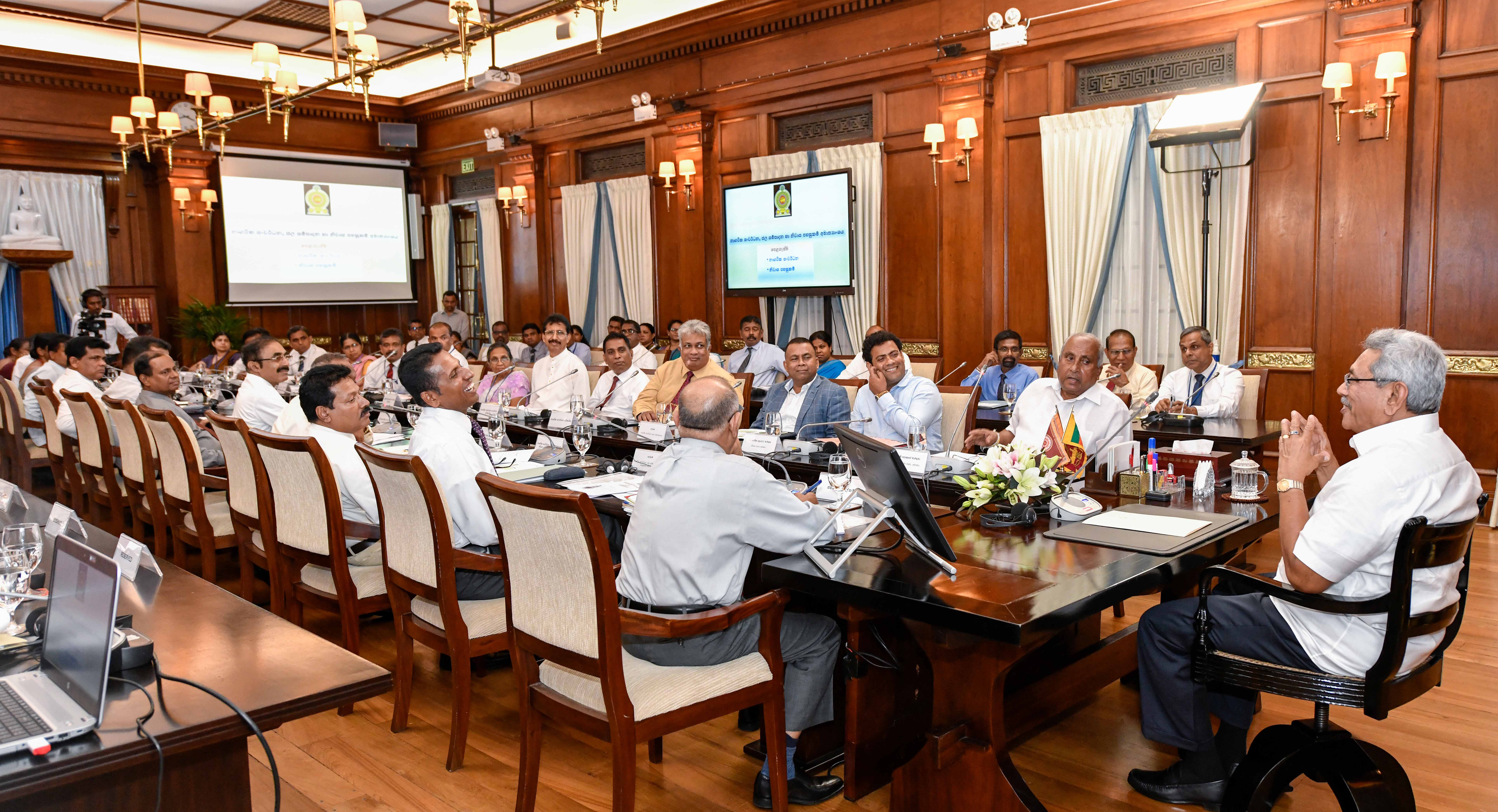

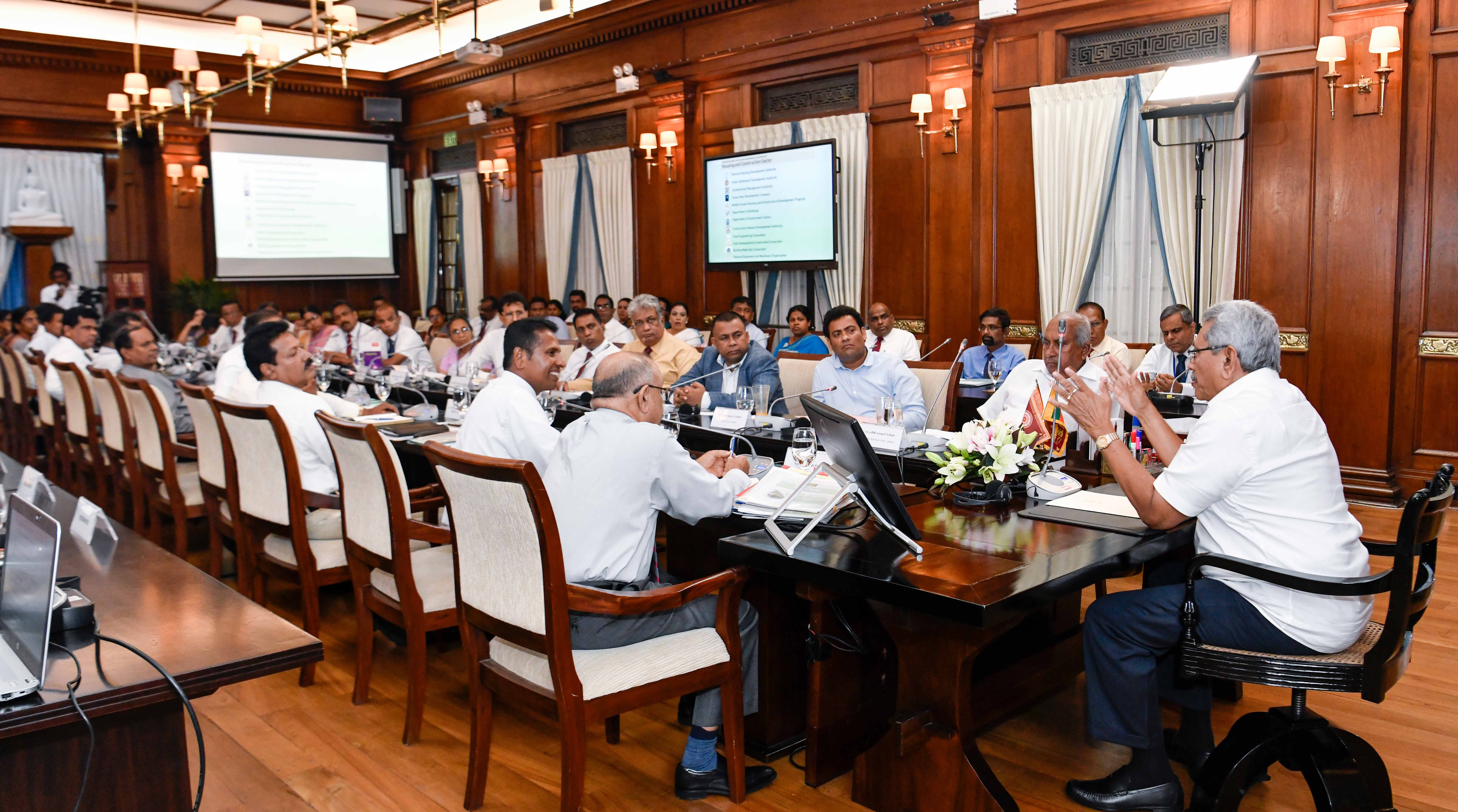
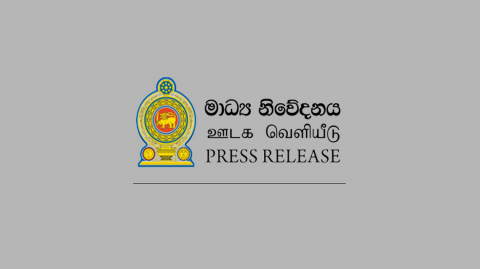
President invited all countries to look positively at Sri Lanka as an investment hub when a delegation representing the European Union (EU) called on President Gotabaya Rajapaksa at the Presidential Secretariat today (06).
Underlying Sri Lanka’s neutrality stance, President pointed out that the best way to overcome regional hegemony would be to assist small countries such as Sri Lanka to develop and move forward at the same pace as the developed countries.
Headed by the Ambassador of the European Union to Sri Lanka Denis Chaibi, the delegation comprised Ambassador of the Kingdom of Netherlands Tanja Gonggrijp, Deputy Head of Mission of the Embassy of Italy Allegra Baistrochchi, Ambassador of Romania Dr. Victor Chiujdea, Ambassador of France Eric Lavertu and Ambassador of Germany Jorn Rohde.
Congratulating the President on being elected to the Office on behalf of his and the delegation Mr. Chaibi spoke positively of a well-organized presidential campaign and the well-delivered speech by the President during the swearing in ceremony.
The envoys were interested to know more about development versus devolution. President Rajapaksa stated that political solutions must go hand in hand with economic development for the benefit of the people. Taking the 13th Amendment as an example, he noted that certain areas cannot be accommodated. Instead politicians must look at alternate solutions. For instance, if police powers were handed over to the Provincial Councils, it would simply lead to politicization of police work.
President Rajapaksa noted weather was a main challenge affecting Sri Lanka’s agriculture. Therefore Sri Lanka needs to explore how methods such as greenhouse can help. He also noted the need for Sri Lanka to move from chemical to organic fertilizer. This will attract different markets. Also, he emphasized the need to make such a transformation as chemical fertilizers and pesticides are a major cause for cancer as well as a pollutant of our waterways.
Netherland Ambassador Gonggrijp agreed and explained the integrated programs Government of Netherlands has already initiated in Sri Lanka with regard to organic farming. The farmers, she pointed out, however need support from the Administration for the transformation to be successful. Italian Ambassador Baistrochchi also spoke of a spice farm project in Uva Province for female farmers that have been initiated by the Italian Government. Currently about 400 farmers are engaged with the program.
The delegation also commended the commitment of the President to address corruption, improve transparency and reward professionalism and meritocracy.
They emphasized that Sri Lanka can rely on the EU as a reliable and long term partner. Hence, an honest and efficient administration is vital component in confidence building with EU partners.
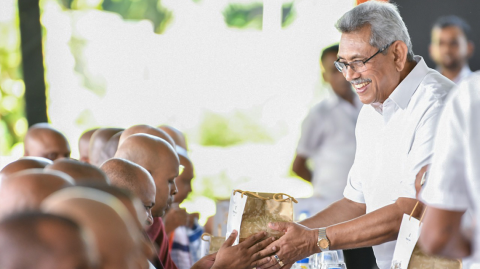
An all night Pirith chanting ceremony and a Dhana Pinkama was held at the President’s House in Colombo to invoke blessings on the citizens and the country.
The Pirith Chanting Ceremony was conducted under the patronage of Most Venerable Muruthtettuwe Ananda, Nayaka Thero, yesterday (04).
The Maha Sangha including Professor Ven. Medagoda Abayatissa Thera, Ven. Omalpe Sumanarathana Thera, Ven. Getamanne Gunananda Thero, Maharagama Nanda Thera, the Chief Incumbent of the Valukarama Temple, Most Venerable Bopitiya Vijitha Thera, Ven. Narandeniya Dhammawasa Thera, Ven Dr.Kirinde Assaji Thera participated on this occasion.
Today (05) the Dana was offered to 300 monks.
The Maha Sangha including the Tri Nikayas’ Sanga Nayaka and Anu Nayake Theros, Most Venerable Warakagoda Sri Gnanarathana Thero, the Mahanayke Thera of Asgiriya Chapterand the Anunayake of Malwathu Chapter Venerable Niyangoda Vijithasiri Thera participated for this Dana Pinkama.
President Gotabaya Rajapaksa, Prime Minister Mahinda Rajapaksa, Ministers and MPs, public officials and several others participated on this occasion.
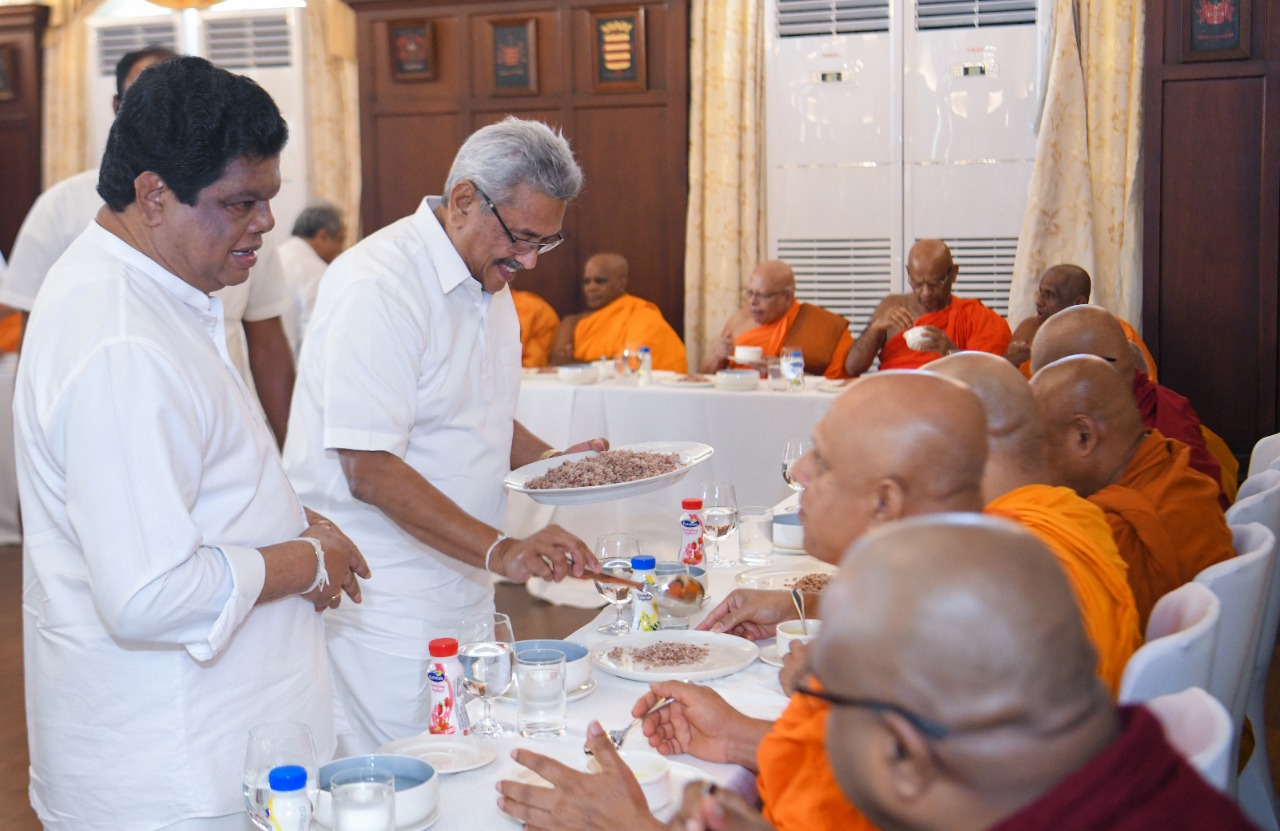
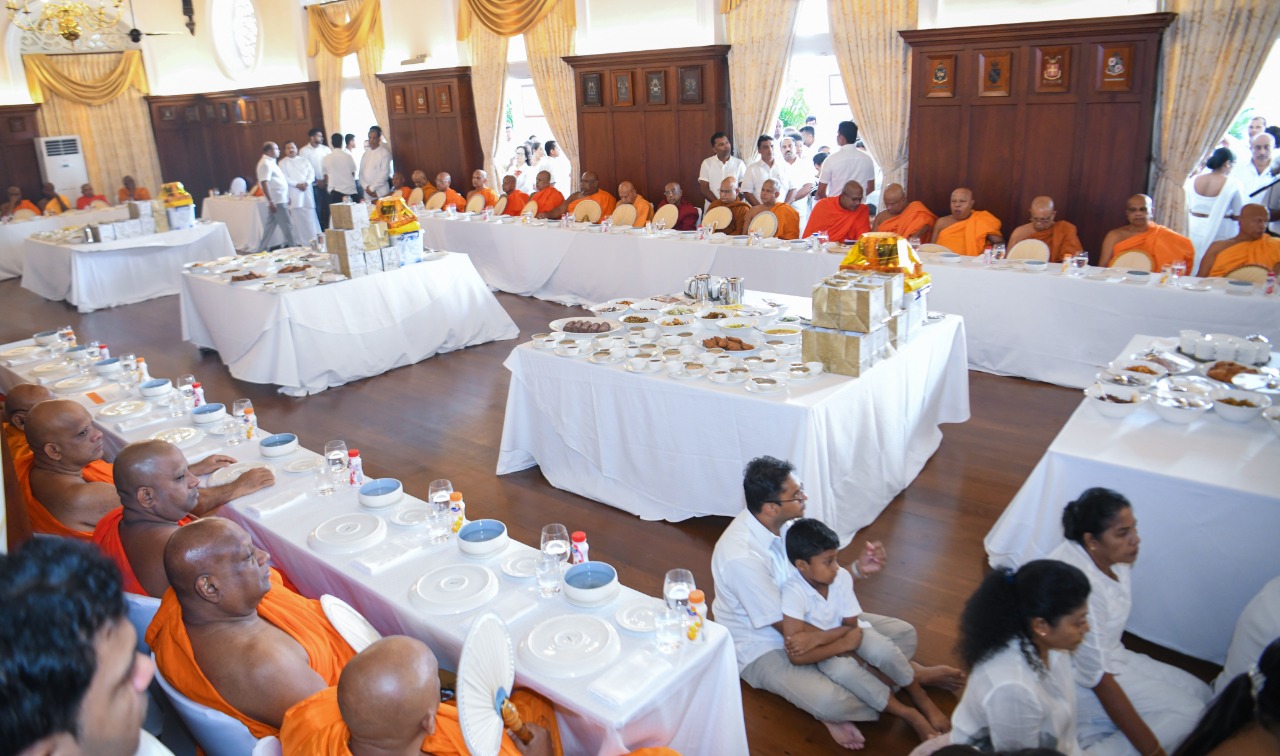
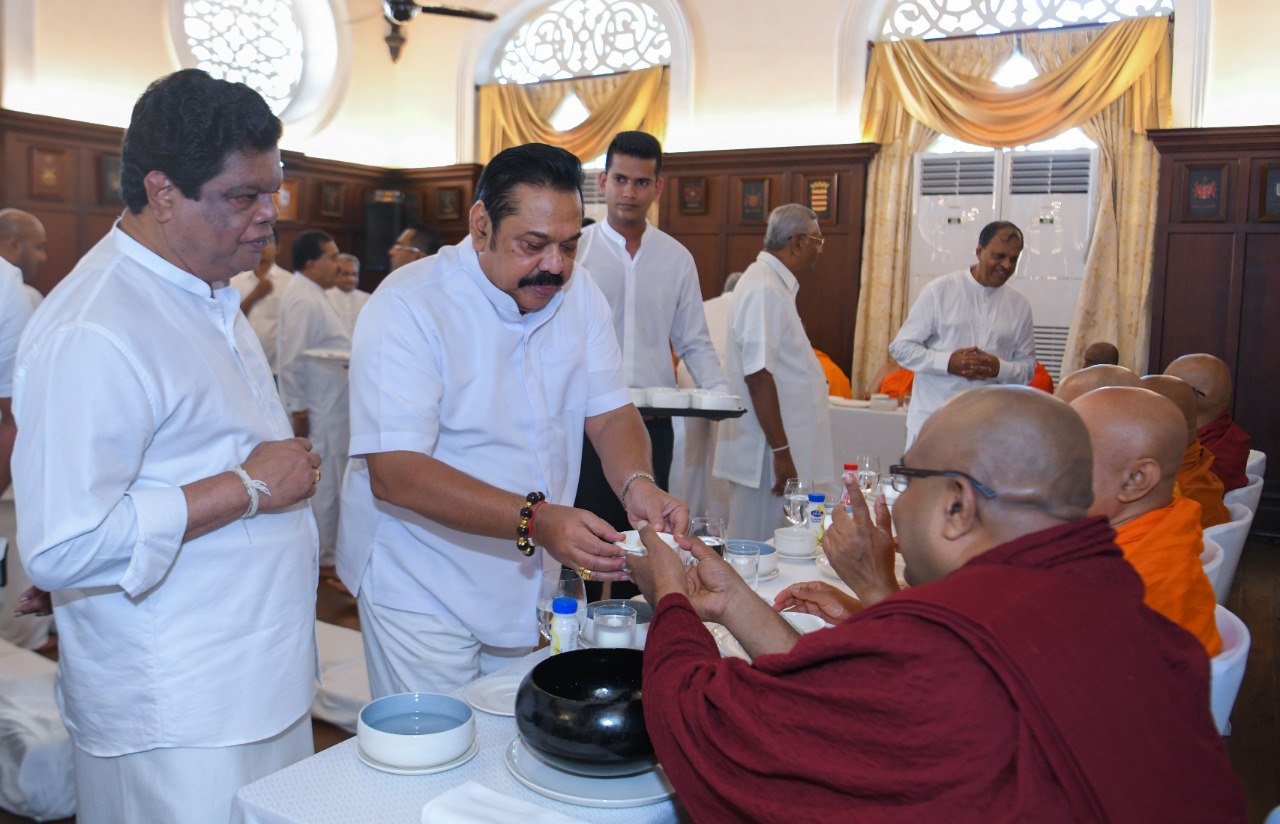
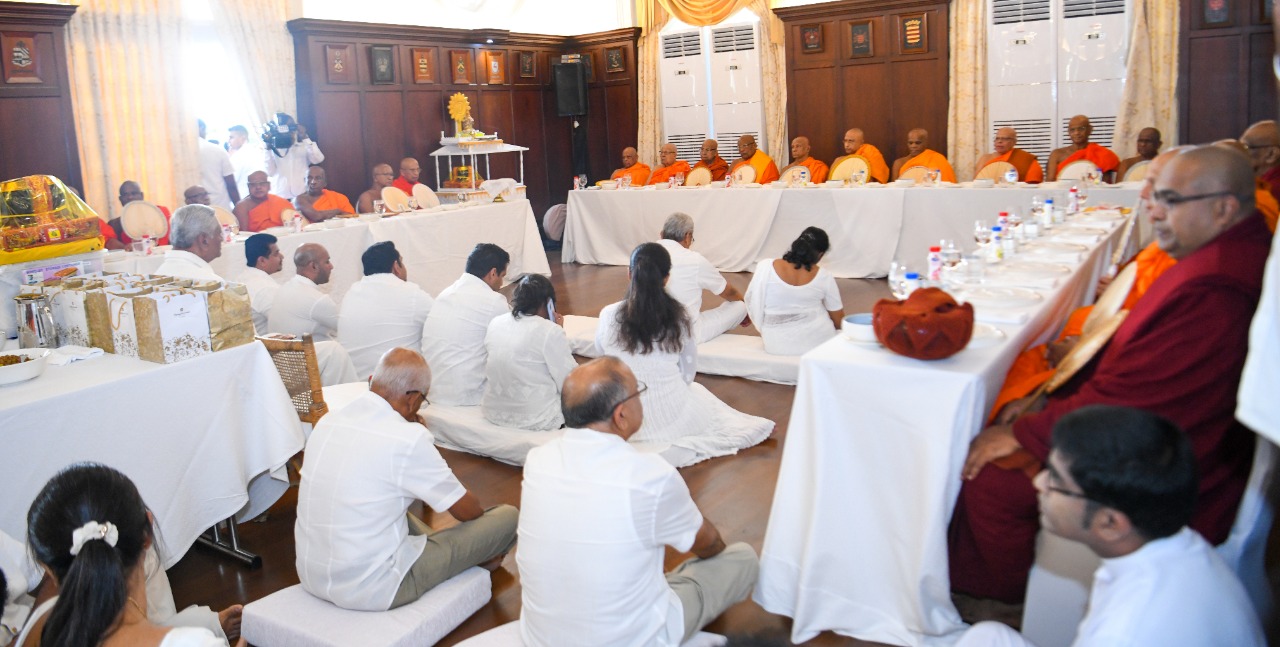
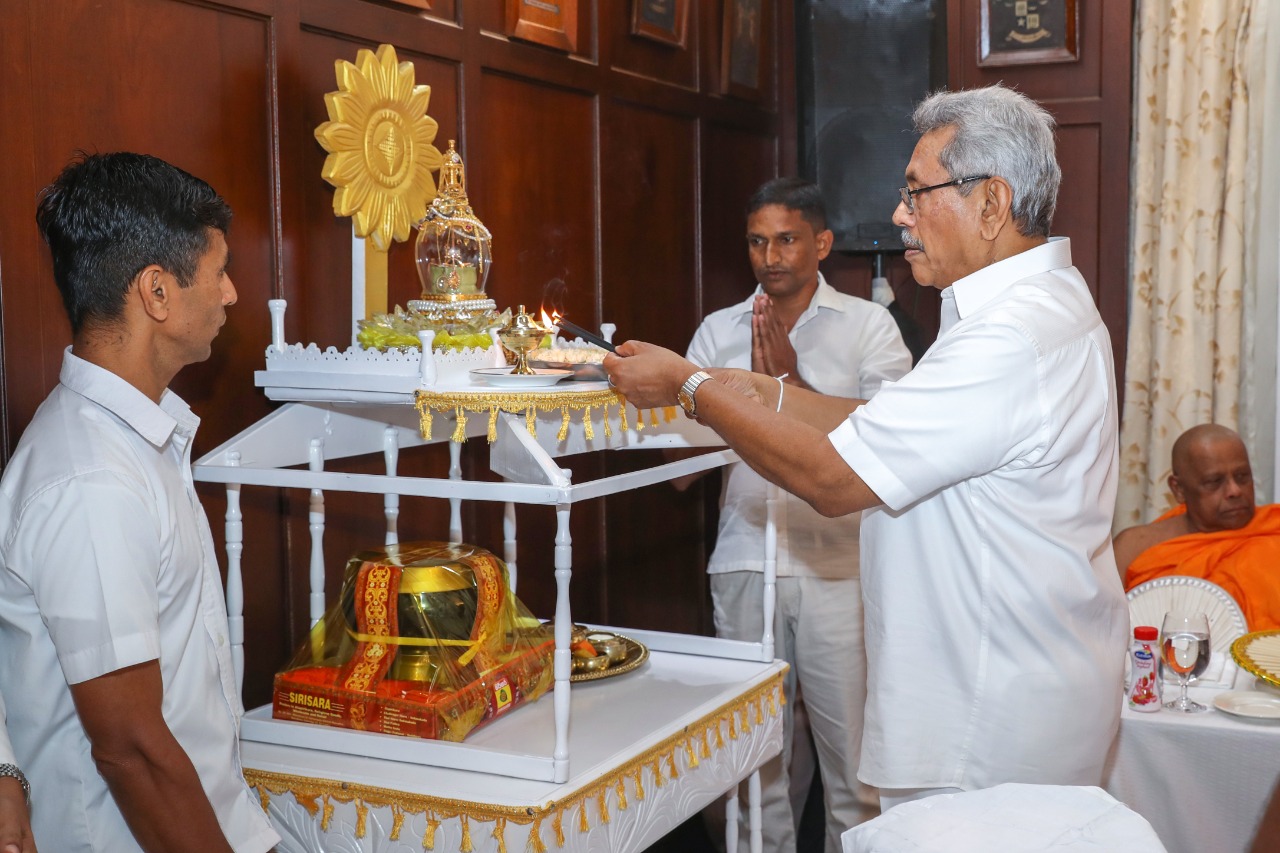
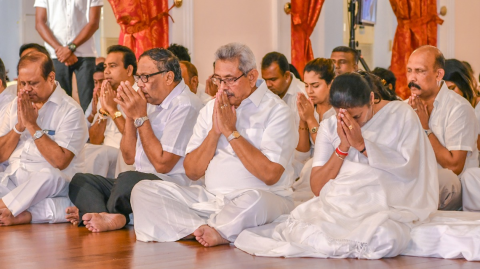
An All Night Pirith Chanting Ceremony was held at the President’s House in Colombo, yesterday (04) to invoke blessings on the President, war heroes, the citizens and the country.
The Dhamma sermon was conducted under the patronage of Most Venerable Muruthtettuwe Ananda, Nayaka Thero and the Maha Sangha including Professor Ven. Medagoda Abayatissa Thera, Maharagama Nanda Thera, the Chief Incumbent of the Valukarama Temple, Most Venerable Bopitiya Vijitha Thera, Narandeniye Dhammavasa Nayake Thera, Ven Dr.Kirinde Assaji Thera participated on this occasion.
President Gotabaya Rajapaksa, Prime Minister Mahinda Rajapaksa, Ministers and MPs, public officials and several others participated on this occasion.
Delivering a special sermon Professor Ven. Medagoda Abayatissa Thera pointed out that the alliance that came together to defeat the L.T.T.E should join again to conquer the economic war and international challenges.
The Nayaka Thera expressed his confidence that the President, Prime Ministers and the rest of the government will commit themselves to make these aspirations of the people a reality.
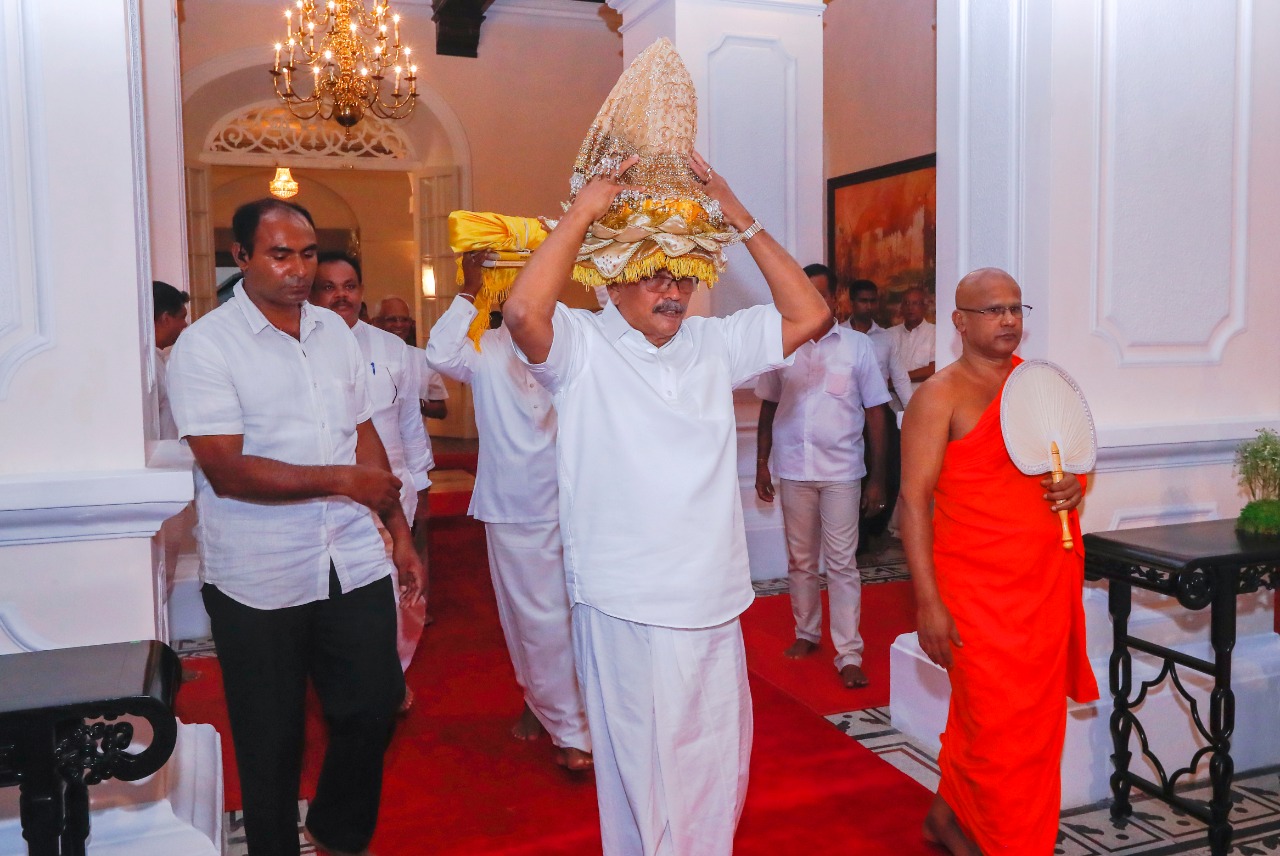
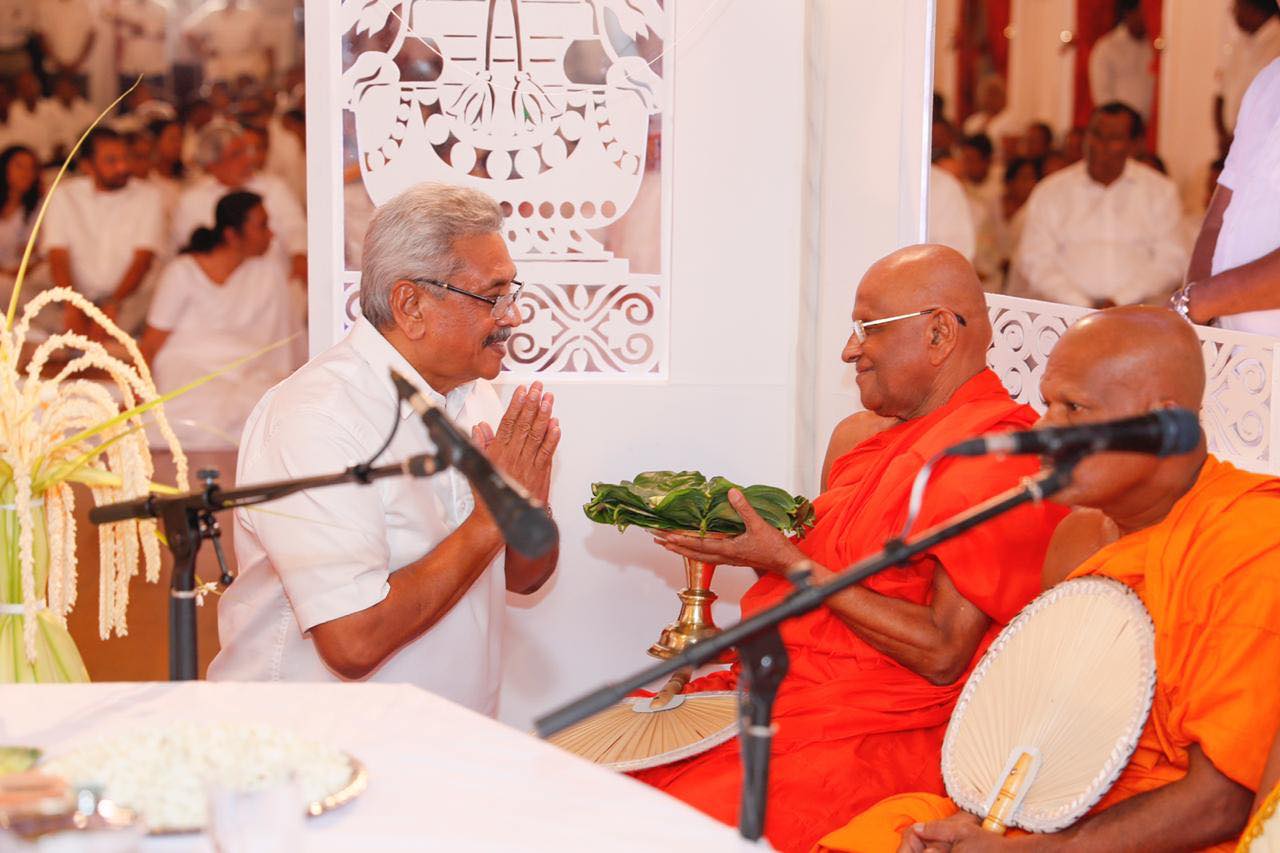
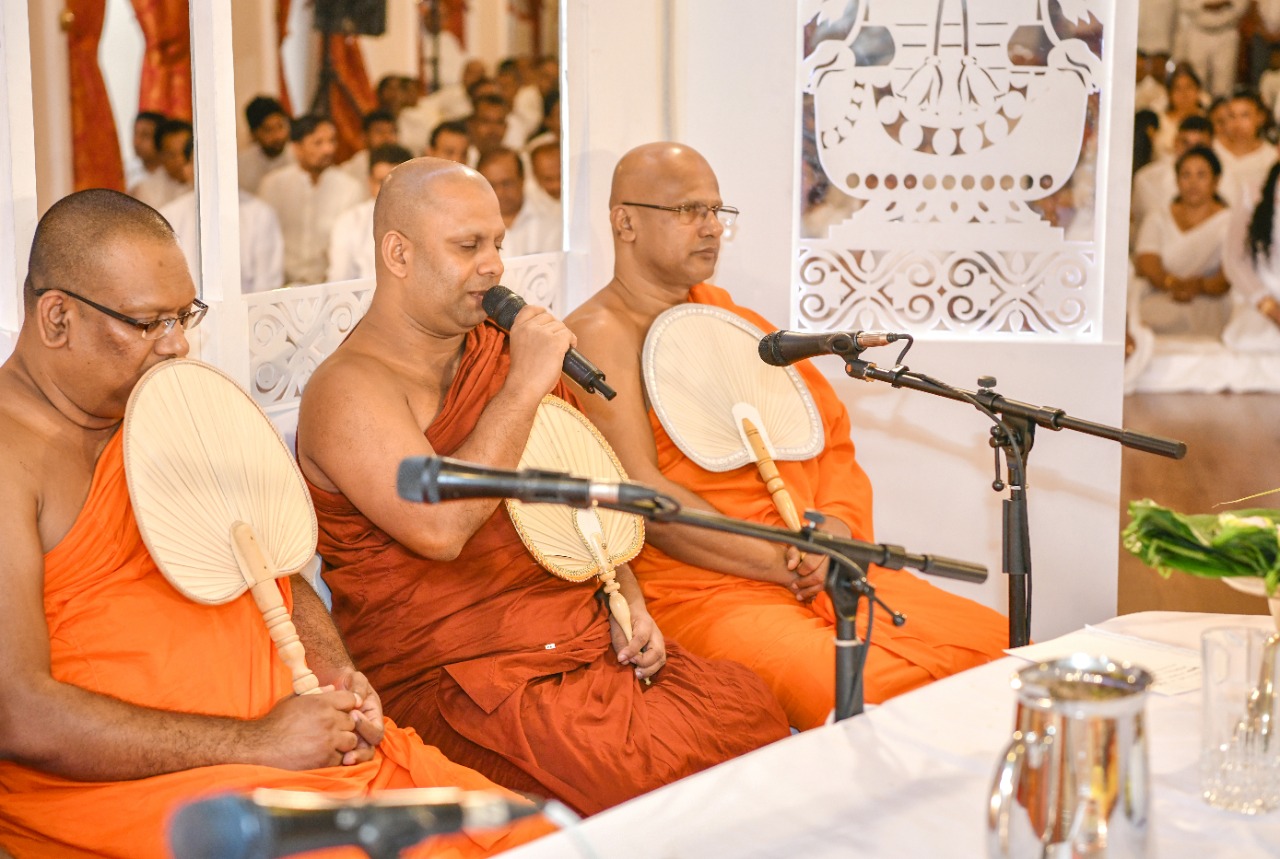
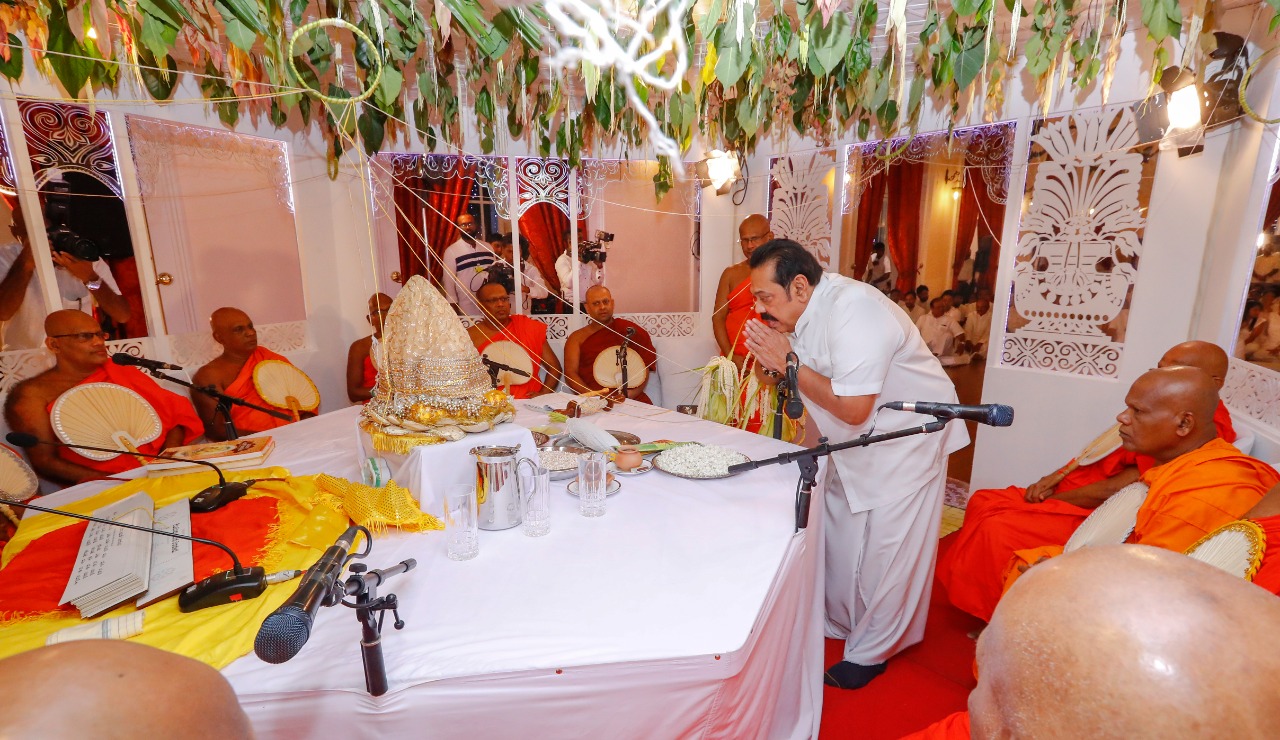
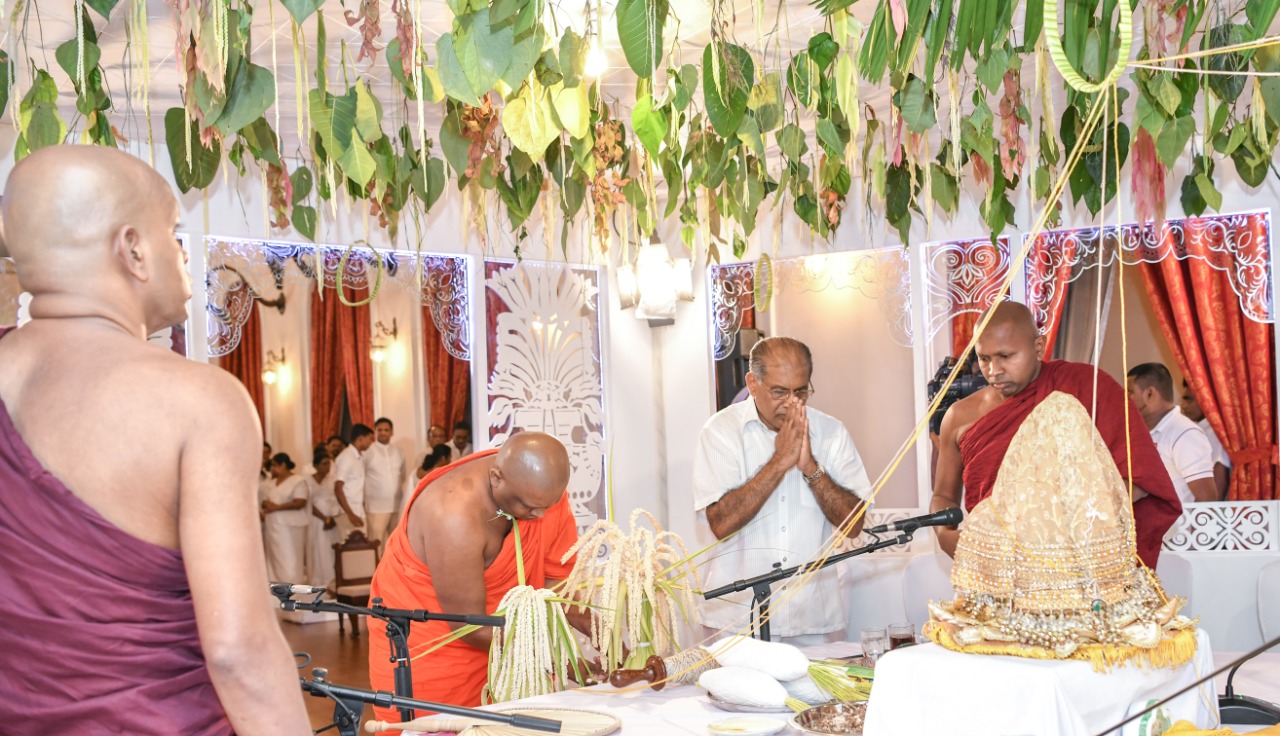
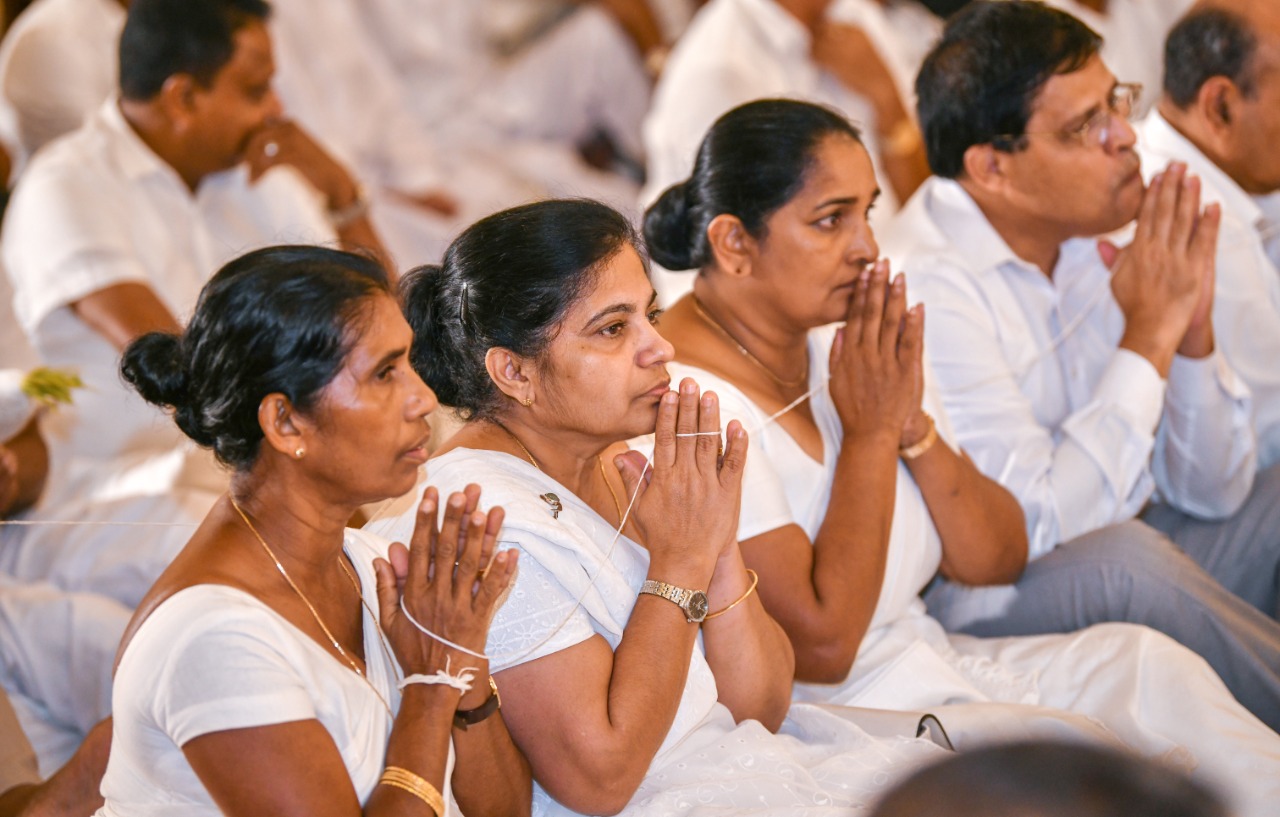

© 2017 – ශ්රී ලංකා ජනාධිපති කාර්යාලය
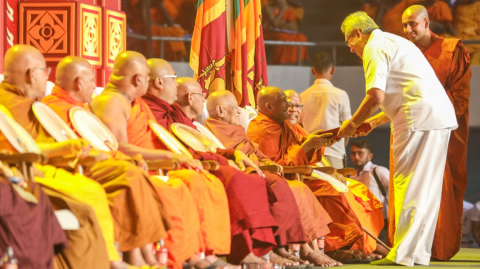
Vibhajjavada Dhamma Sangayana organized for the continued sustenance of the Buddhism and the donation of Tripitaka Dhamma scripts to 5000 monks commenced at the Sugathadasa Indoor Stadium today (04).
The concluding ceremony of the event was held under the patronage of President Gotabaya Rajapaksa and Prime Minister Mahinda Rajapaksa this evening.
This Dhamma Sangayana was organized by Labunorukanda Aranya Senasana under the guidance of Dharmacharya Ven. Mankadawala Sudassana Thero of Labunorukanda Aranya in Anuradhapura and Sasanadhipathi Shashrapathi Rajakeeya Panditha Ven. Kothmale Kumara Kassapa Thero.
The event included orations and open discussion fora with the participation of erudite Maha Sanga to discuss ways and means to preserve the original teaching of the Buddha.
The meritorious act of donating Tripitaka and Atta Katha in digital form to 5000 clergies was also held today.
The President and the Prime Minister donated Tripitaka tabs to Maha Sanga.
The “10-year Vibhajjavadee Plan” for the upliftment of Buddhism and the proposal to set up “Theravada Dhamma Script Donation Fund” to provide Tripitaka Dhamma texts to temples around the country free of charge were also presented to the President and the Prime Minister.
The Maha Sangha including the Maha Nayaka Theros of the Tri-Nikayas and Anu Nayaka Theros, former President Maithripala Sirisena, Speaker Karu Jayasuriya , Ministers and MPs participated on this occasion.
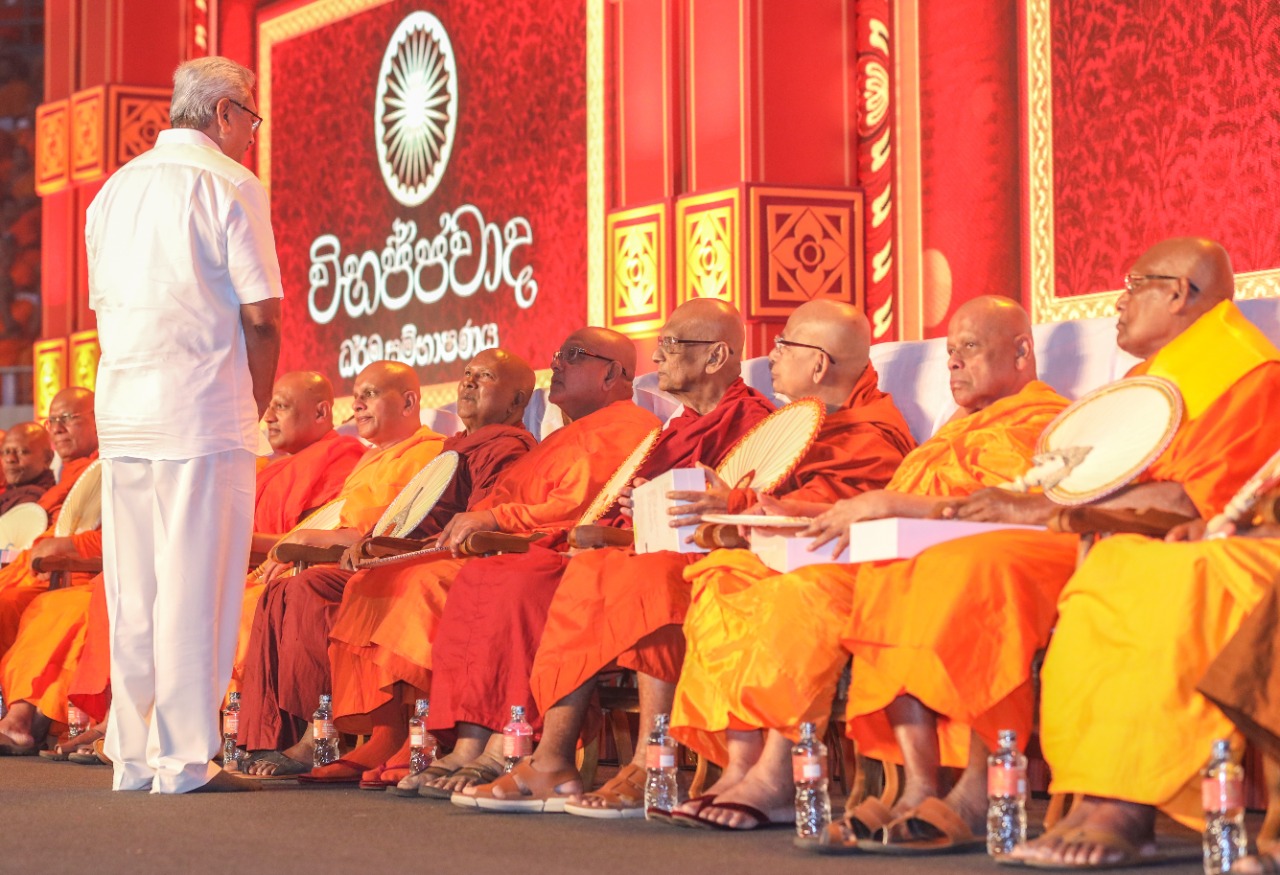
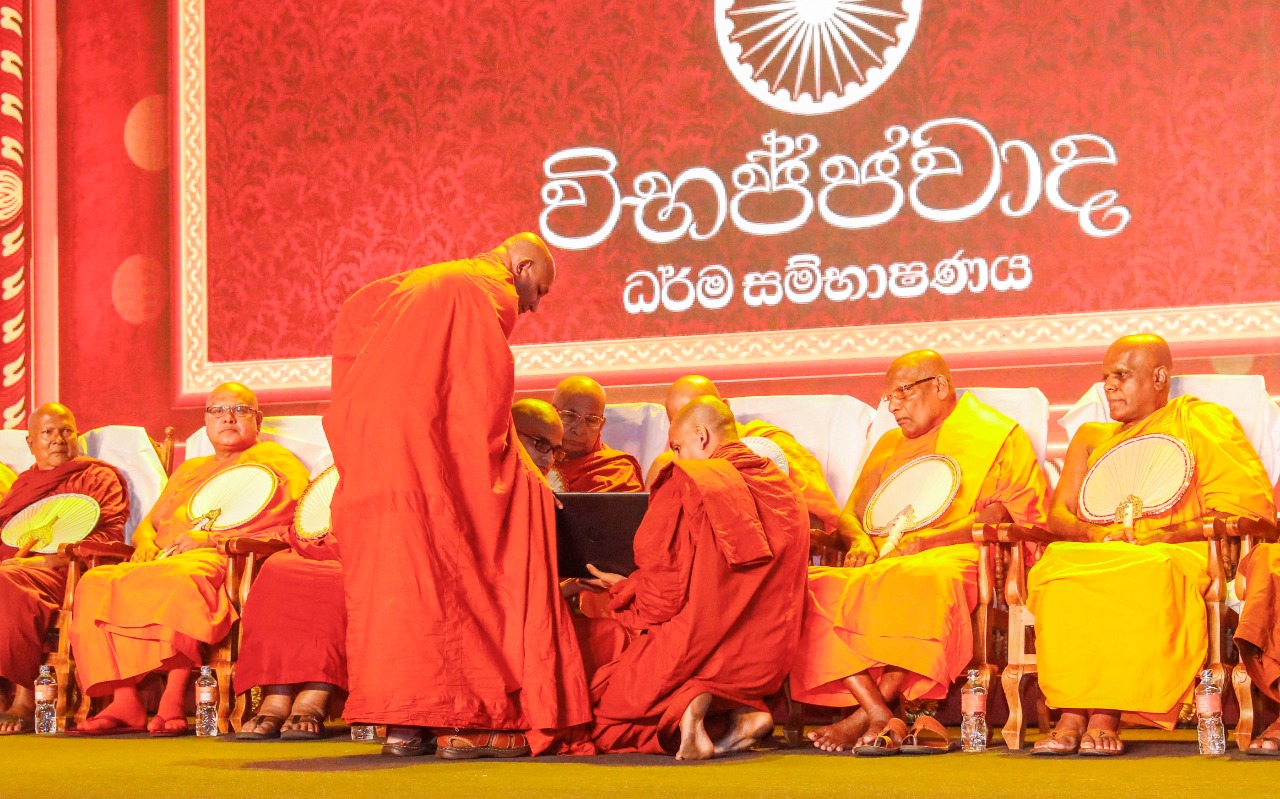
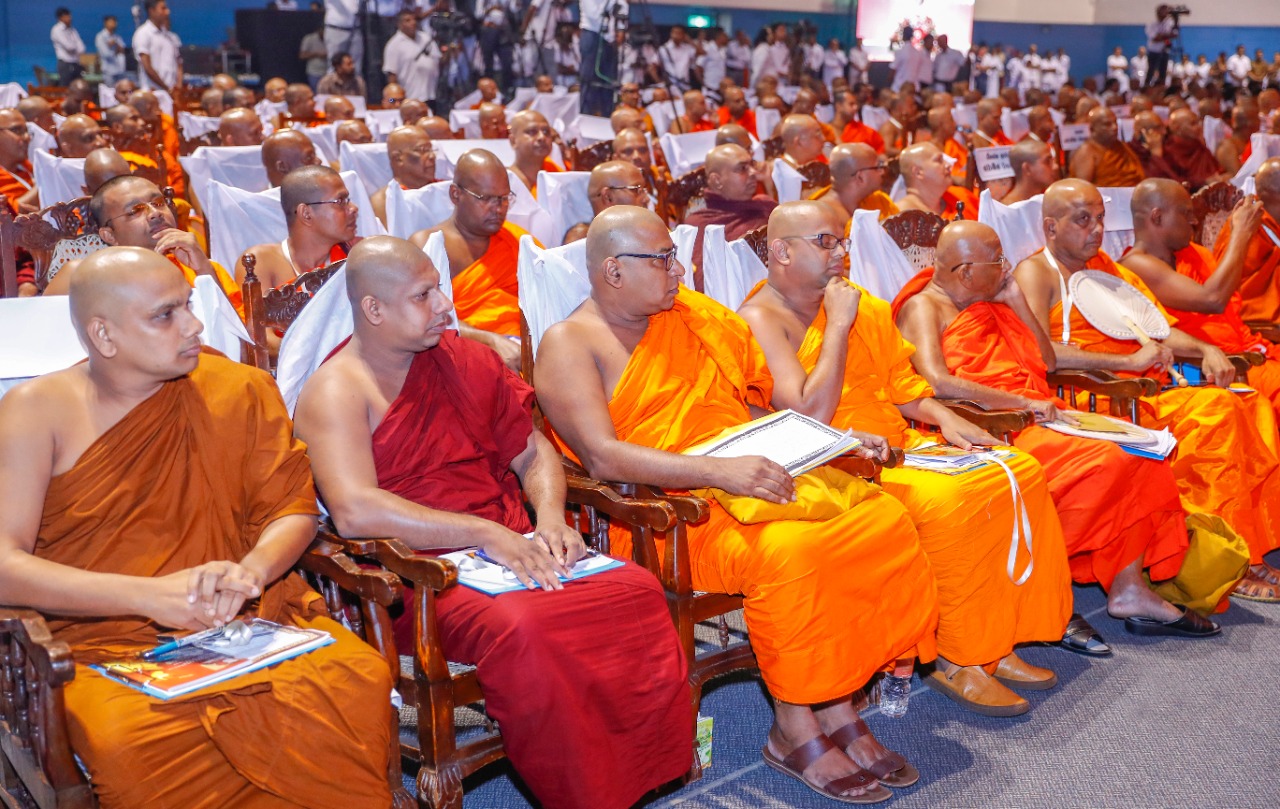
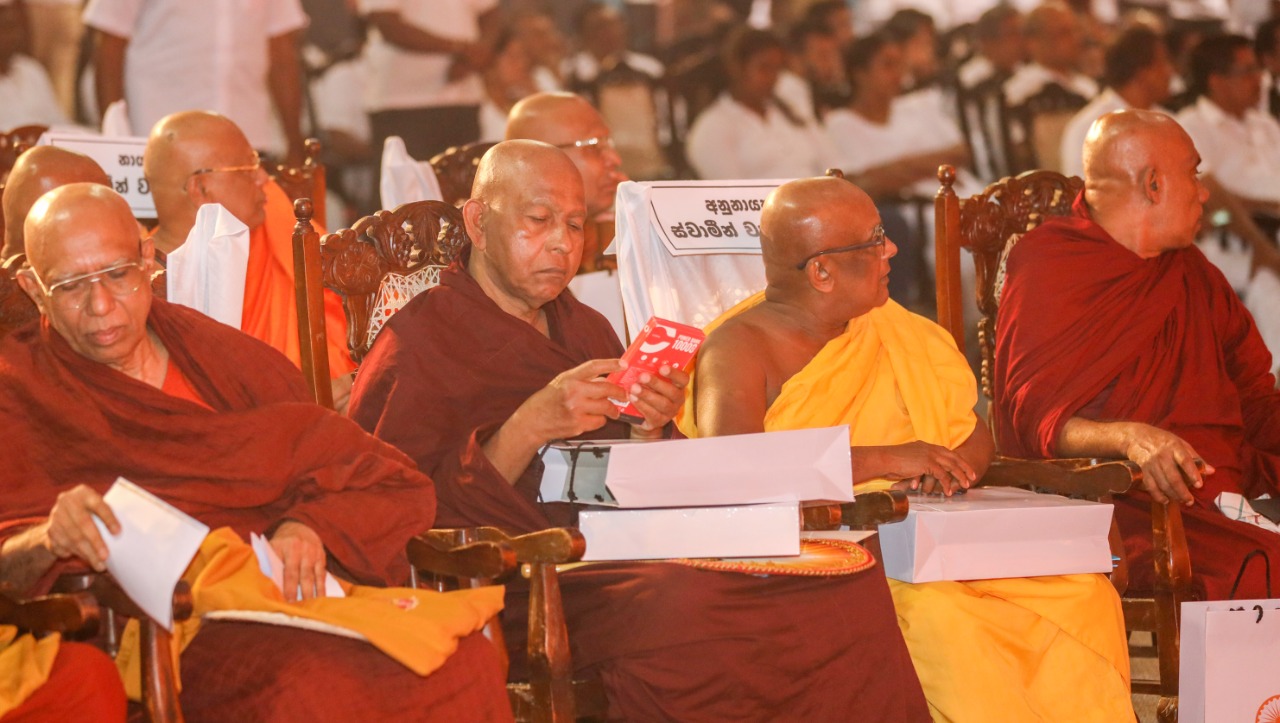
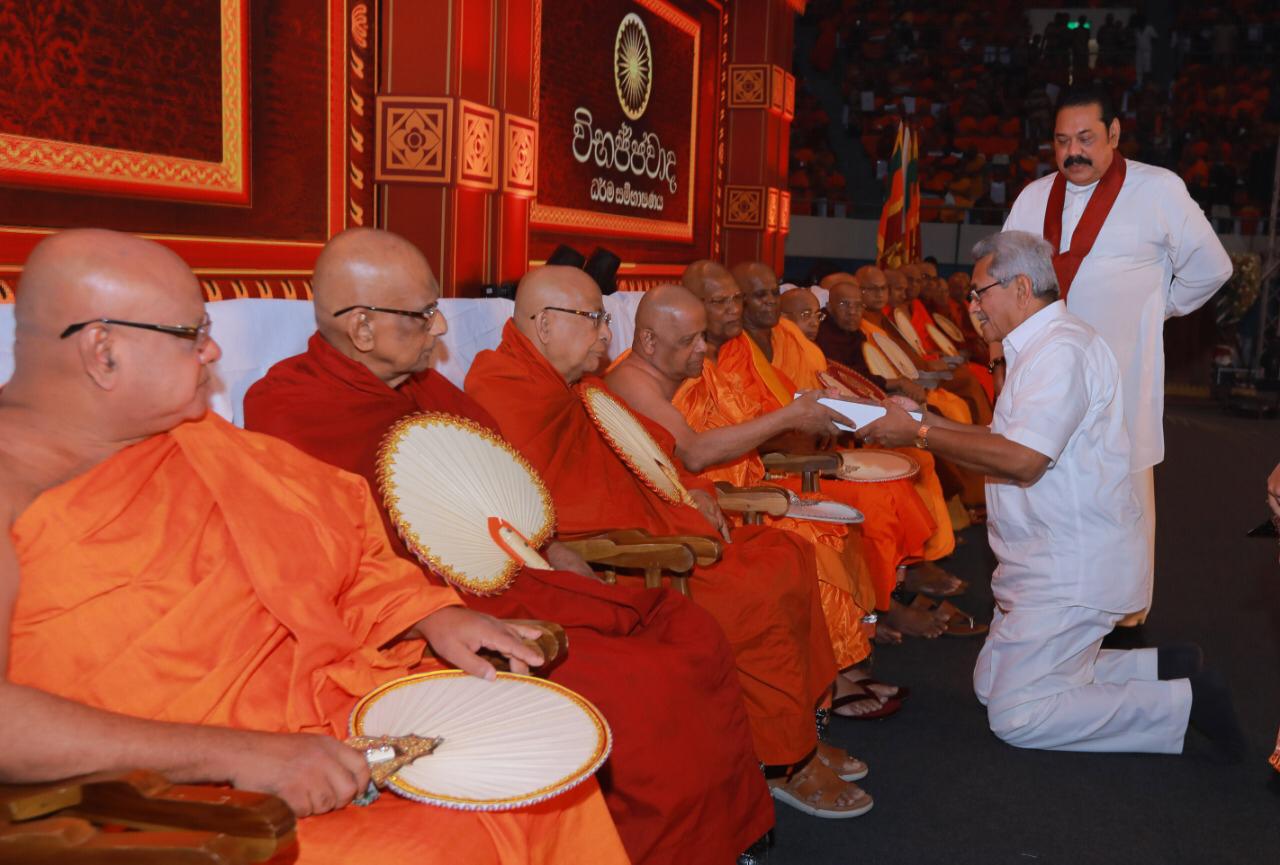
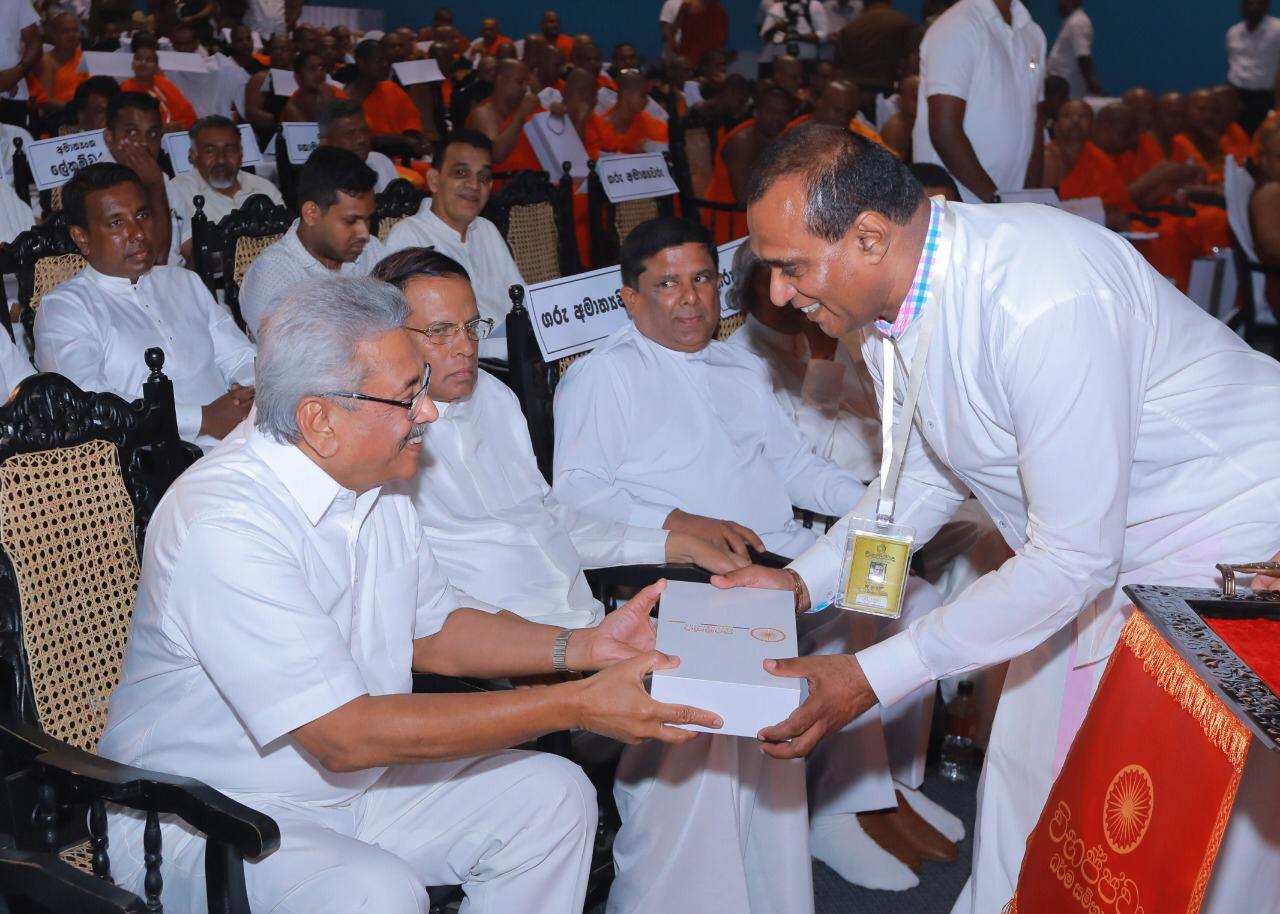
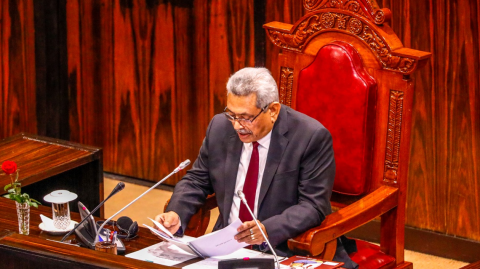
Full text of the speech:
Honourable Speaker, Honourable Prime Minister,
Honourable Leader of the Opposition,
Honourable Ministers, Honourable State Ministers, Honourable Members of Parliament,
I have this opportunity to address you as the Head of State of the Democratic Socialist Republic of Sri Lanka consequent to the historic victory granted to me by the people of this country on the 16th of November.
I express my gratitude to all citizens, institutions and all political parties who were committed to a peaceful, free and fair election.
Irrespective of the political party you, the Honourable members in this august Assembly belong to, together all of us have as our prime responsibility to work for the betterment of the people of this country.
I have served this nation as an Army Officer for twenty years, and as Secretary of Defence for nearly another ten years.
Even though I was not actively engaged in politics, I have experienced what service to the people is, from an early age.
My father’s elder brother, D. M. Rajapaksa, began his political journey in the State Council in 1936, representing the Hambantota electorate. After his demise in 1945, the people of Hambantota elected my father, D. A. Rajapaksa, to the State Council. Later, he was elected through the popular vote as a Member of the country’s first Parliament.
From that time until now, many members of the Rajapaksa family, hailing from the rural village of Medamulana in Giruvapaththuwa, Ruhuna, have served as elected public representatives. There have not only been Members of Parliament, Deputy Ministers, Cabinet Ministers, a Deputy Speaker of Parliament, a Speaker of Parliament, a Leader of the Opposition and a Prime Minister, but also two Presidents elected to office by the people, who reposed their trust in us.
From the first day the honourable D. M. Rajapaksa, known as the Lion of Ruhuna, appeared in the State Council, he wore a maroon coloured shawl.
What he symbolized through this maroon shawl were the millet farmers of Giruvapaththuwa.
Following D. M. Rajapaksa, my father D. A. Rajapaksa and each member of the Rajapaksa family who was elected to Parliament wore the maroon shawl.
Even though I do not wear this shawl, I stand for the same profound philosophy of constant dedication to the poor that is symbolized by the maroon shawl.
It is this same philosophy that is embodied in the Policy Statement I presented during my Presidential election campaign.
Honourable Speaker, I now take this opportunity to table the “Visions of Prosperity and Splendour” Policy Statement.
The people of this country gave me a clear mandate at the Presidential election held on 16th November 2019. That mandate was granted because of the trust the people had in me. I, together with my Government, stand committed to honour the trust of the people and implement the programme of developing a prosperous nation that we promised to them.
The people who elected me to office desired a profound change in the political culture of this country. They rejected political agendas founded on race. The majority of the people proved that it is no longer possible for anyone to manipulate and control the politics of this country by playing the role of king maker.
I invite the politicians concerned to understand this reality. I call upon all to join together in the national undertaking to develop this country, and to reject the politics based on petty agendas that have sown division in our society in the past.
We must always respect the aspirations of the majority of the people. It is only then that the sovereignty of the people will be safeguarded.
In accordance with our Constitution, I pledge that during my term of office, I will always defend the unitary status of our country, and protect and nurture the Buddha Sasana whilst safeguarding the right of all citizens to practice a religion of their choice.
I remember my father being at this Parliament, during my childhood. I often used to watch Parliamentary proceedings from the public gallery. The Parliament we had then was exemplary. The discourse that took place in it was of great importance. The debates were replete with logic and rich arguments. School children and adults were eager to come to Parliament to listen to those debates. Members of Parliament always behaved in a way that upheld the dignity of the Parliament and the office they held. The people then had great respect for the Parliament. They respected people’s representatives. Unfortunately, latterly, that respect gradually waned.
This Parliament should once again become an exemplary institution where the real issues of the people are discussed, where matters concerned with national policy are subjected to debate, and where the responsibilities of the legislature are duly fulfilled. The responsibility of ensuring that the Parliament once again becomes an institution winning the respect of the people lies with the Members who are in this House.
There is a social, economic and political crisis in the country today. Even after 70 years of Independence, we cannot be satisfied with the country’s development. We all have a responsibility to change this situation. We must be prepared to make the sacrifices required for this.
The primary responsibility of a people’s representative is service to the people. We should all remember that the offices we hold are not privileges, but responsibilities.
To develop the country, the right vision and plans are needed. The Policy statement, “Vistas of Prosperity and Splendour”, placed before the people at the Presidential Election by me contains a national programme that was crafted during a period of nearly four years by incorporating my vision with the ideas and recommendations of national organisations such as Viyathmaga, the findings of the “Conversation with the Village” programme conducted by the Sri Lanka Podujana Peramuna, the discussions held with other political parties, and the ideas contributed by the general public.
In accordance with that programme, we have already taken several steps including the easing of taxes that were unduly burdening the public, introducing a high degree of transparency and efficiency to the government administration, and curtailing unnecessary government expenditure.
In our policy, National Security occupies the foremost place.
We have already taken steps to strengthen the national security apparatus. Talented officers have been given appropriate responsibilities again. We have taken steps to ensure proper coordination between the Armed Forces and the Police, who are collectively responsible for maintaining national security. The network of national intelligence agencies has been reorganized and strengthened.
We will take all necessary steps to make our motherland a safe country free of terrorism, extremism, underworld activities, theft and robbery, extortionists, the drug menace, disruptions of public order, and the abuse of women and children.
Our primary purpose is to create a productive citizen, a happy family, a disciplined society and a prosperous nation.
The Government must take the initiative to make every healthy citizen of employable age a useful and productive citizen. What we need is for all of them to contribute to the nation’s economy.
We must ensure that the benefits of development reach every group of people. We must employ modern methodologies and indicators to gauge whether the needs of the people are truly being met, and whether they are happy. It is no longer necessary to wait for elections to find out how people feel about the work programme of the Government.
We need everyone’s support for our efforts to reduce the cost of living of the people. The corporate sector must ensure that some percentage of the benefits of the tax concessions recently provided to them are passed onto the public as well. Accordingly, we expect a reduction in the price of all goods and services on which taxes have been reduced.
Eliminating poverty is a priority of our Government. We must understand the causes of poverty and find solutions to eliminate such causes. We will be able to alleviate poverty by finding practical approaches to issues such as the lack of proper education or skills, the lack of land for cultivation, or the lack of capital for self-employment.
We have made plans to find employment opportunities for 100,000 young men and women from low income families within the next month. My government is prepared to present practical solutions to resolve unemployment, with the public sector and the private sector working together.
One of our main themes during the last election was the development of a virtuous, law abiding and disciplined society. The public has given us a mandate for this purpose.
Ours is a country with an ancient history, and a society nurtured by Buddhist teachings and the teachings of other world faiths. We must always safeguard our culture and our values.
Our target is to make Sri Lanka a developed country. It must be a sovereign, independent nation. Also, it must be a safe, and a peaceful country. Sri Lanka will be a prosperous nation only when all of these are achieved.
We have introduced a people-centric economic policy through the “Vistas of Prosperity and Splendour” manifesto.
Its main aims are to ensure economic stability for all citizens, provide equal opportunities to all who seek to improve themselves, to establish a clean and efficient state sector that is committed to public service, and to protect and empower local entrepreneurs.
In order to successfully establish a people-centric economy it is important that every official from the highest to the lowest level of government becomes aware of our vision and aims. That will enable them to perform their duties more productively.
We must also implement a special programme to combat corruption and fraud. Legal action must be taken promptly against all who engage in corrupt practices, irrespective of their status.
Today, most countries have employed technology as a means of enhancing the efficiency of the state sector. Through this, it will also be possible to provide equal opportunities for all. As such, we will pay special attention to increasing the use of technology in government institutions.
We must plan for the future, based on the geographic location, natural resources and human resources of our country.
Sri Lanka has been an international trading hub for merchants from Greece, Rome, Arabia, China and various other nations for thousands of years. One of the main reasons for Sri Lanka’s renowned standing was our country’s unique location in the ocean connecting the east and west. We can benefit from this advantage in the same way today.
During the period from 2005 to 2014, the government of President Mahinda Rajapaksa planned to develop Sri Lanka into the commercial hub of South Asia.
The Mattala Airport was built adjacent to the Hambantota Port with the aim of establishing an industrial city in the south.
The decision to develop the Colombo Port City was taken with the aim of making Sri Lanka a hub for finance and commerce in Asia. We must carry forward these projects that were designed according to achieve long term objectives.
If we work according to a proper plan, we will be able to encourage international businesses to locate themselves in Sri Lanka and supply goods and services to regional neigbouring countries. To encourage such investors, we must be prepared to swiftly provide all the facilities they require within Sri Lanka.
For economic development to occur, it is important that we accelerate improvements to the road network, including the expressways, so that travel from any one part of the country to another in a few hours becomes possible. The development of the train service is an integral part of this programme. We can also help alleviate the grave problem of heavy road congestion through an efficient and comfortable train service.
Urbanization brings both good and bad results to a country. We need a restructuring programme to ensure that the benefits of development reach every region of the country. This will help us reduce congestion, pollution and the cost of living. People dispersed throughout Sri Lanka should have access to facilities for education and healthcare, and opportunities for employment, within their own area. The development of the roads and rail network together with the provision of high-speed internet and telecommunication facilities throughout the country is essential for this.
The cost of electricity is an important factor in economic development. It particularly affects the attracting of investors to the industry sector. We need short-term and long-term solutions to generate power at a reasonable price. In looking at long term solutions, our principle is to pay special attention to the use of eco-friendly renewable energy sources such as solar, wind and hydro-power.
Although our country is rich in gem and mineral resources, relevant value-added industries have not yet developed to international standards. Each year, the country is deprived of significant foreign exchange earnings through the export of these natural resources without value addition. We should establish a world class marketplace in which gems from not only Sri Lanka but even from African nations can be sold after value addition.
While we should provide new technological facilities for conducting oceanic and geological surveys, we must provide special incentives to encourage investments in industries that will provide value addition to Sri Lanka’s mineral resources.
We will not allow various laws, permits and restrictions to impose unnecessary and unfair limitations on some of Sri Lanka’s traditional livelihoods, including the gem industry, tile industry, brick industry, carpentry and handicrafts.
When planning for the future, more attention than at present must be given to the agriculture, plantation and fisheries sectors. As a country that possesses a large oceanic economic zone in temperate waters, we can develop these industries much further.
We need to increase earnings from agricultural produce such as spices, fruits, vegetables, grains, meat and fish, for which there is export potential.
One third of the country’s population is engaged in agriculture, plantation industries and the fisheries sector. We must raise their standard of living.
There is a need for new technology-based approaches that can develop these industries beyond traditional farming methods.
Encouraging the production of food free of pesticides and chemicals, by increasing the use of organic fertilizer for agriculture is part of our policy. We must prepare plans to encourage Sri Lanka’s entire agriculture sector to shift to using only organic fertilizer within the next decade. Increasing domestic production of organic fertilizer should be included in these plans.
The problems that had been caused to growers of export-oriented crops through the allowing of unlimited re-exports were addressed by the new Government soon after its assumption of office. Instructions have already been issued to completely stop the re-export of agricultural products.
More attention has to be paid to the ocean economy. We will introduce a systematic programme to improve the fisheries sector through the introduction of new technologies and equipment. Existing harbours will be improved and new harbours developed to cater to the requirements of multi day vessels that engage in deep water fishing.
Introducing new technologies to further develop the inland fisheries sector is also part of our plan. Protecting the natural environment for our future generations is one of our fundamental responsibilities. We will pay special attention to environmental protection in the formulation and implementation of government policies.
We hope to make Sri Lanka one of the world’s leading nations in achieving the United Nations’ Sustainable Development Goals.
Our most valuable resource as a nation is our future generation. As such, we have identified the development of our human capital as one of the primary responsibilities of the government.
We have to pay special attention to ensuring that our future generation will become productive citizens by nurturing them with the required knowledge, skills and abilities. The opportunities young people have to pursue higher education and technical education should be broadened. The infrastructure facilities needed for this must be developed within a short time frame. The number of students entering tertiary education can be increased through more effective utilization of the capacities of state universities and other higher educational institutions.
Some of the courses taught in universities today are not in consonance with market requirements. In the near future, we intend to introduce short-term courses to equip our university students to meet the needs of the modern job market, which they can opt to attend whilst pursuing their current courses of study. Universities and other higher education institutions should be given more freedom in the enrollment of students and in the restructuring of their syllabi to meet the needs of the marketplace.
Institutions in the country that currently teach diploma level programmes must be gradually enhanced to the level of degree awarding institutions. As a preliminary step, we look forward to upgrading teacher training schools and nursing schools to degree awarding level. The shortage of trained graduate teachers continues to be a problem in the education sector. Further, by upgrading the existing 3-year diploma programme in Nursing into a 4-year degree, and by improving the English knowledge of nurses, we will create opportunities for them to even seek work abroad by providing services that meet international quality standards.
Colleges which provide technical and industrial training need to be strengthened to cater to more students who have studied up to the Ordinary Level examinations but not progressed beyond the Advanced Level examinations. The funding and facilities provided to these institutions need to be increased. This will not only enable us to create a workforce that has received vocational training in line with global standards, but also enable such trained personnel to seek high wage employment in the fast-evolving marketplace both here and abroad.
Many young people are currently deprived of employment opportunities due to their lack of proficiency in English. We will introduce a special programme to improve the facilities provided for English education in all schools, and to recruit the required teaching staff.
We intend to entrust our foreign Missions with special responsibilities to seek new employment opportunities for our youth. We can enhance Sri Lanka’s image in the global job market and earn more foreign income by sending trained and qualified workers in all fields to work abroad, instead of untrained workers.
The education sector can be a significant foreign exchange earner. A large number of Sri Lankan students presently study at higher educational institutes in Asia. Instead of sending our students abroad for higher education at a high cost, we should introduce a programme to attract foreign students to Sri Lanka. We must prepare short term and long term programmes to improve the global ranking of our universities.
Sri Lanka is still referred to as a developing country even after 70 years of our achieving independence. We must identify the opportunities that would allow us to move away from this situation and to become a developed country.
With a population of over 5 billion, Asia is undergoing an economic boom and the center of gravity of the global economy is moving towards it.
The fastest growing middle class with high purchasing power is in this region. That is why we must encourage our local entrepreneurs to seek new markets in Asia.
The 21st Century is known as the Knowledge-centric Century.
New technologies such as Artificial Intelligence, biotechnology, robotics, 3D printing, and the Internet of Things, amongst others, are continually changing the world.
Most developing nations have grasped this reality. They are spending substantially to attract technology centric investments.
We must pay attention to this in the formulation of our investment policies. We must understand what type of investments we need to spur future economic development. We must provide special incentives and concessions to encourage investors who are capable of introducing new technologies to the country.
It is also very important to direct our youth to learn these new technologies and undertake research relevant to them. We must assist our education system to speedily prepare to facilitate this change without delay. We must also take steps to promote English education as well as Information Technology usage amongst our youth.
It is important to understand that we have market opportunities beyond technology heavy sectors. One sector we can very swiftly develop is the tourism industry. This sector, which earned 4.4 billion US Dollars in 2018, has space to grow to one that can earn revenue in excess of 10 billion US dollars within the next few years. We will introduce a systematic programme to achieve this.
For us to reap the full benefits of democracy, the government administration must function in an exemplary way.
As we noted in our Policy Statement, we will appoint persons with subject knowledge and suitable qualifications to discharge their responsibilities to govern state institutions efficiently and profitably. After the formation of the new Government, we established a committee to evaluate and recommend suitable persons for the governance of state institutions.
We saw the rapid development of the Sri Lankan economy during the 2005 to 2014 period. Infrastructure such as the road network, housing, electricity, water, and communications and spheres such as garbage management and urban beautification all saw rapid development. We can recreate this momentum by establishing a skillful administration.
Honourable Speaker,
The success of a democracy rests upon the Constitution. The 1978 Constitution, which has since been amended on 19 occasions, has given rise to many problems at the present time because of its inherent ambiguities and confusions.
In order to safeguard the security, sovereignty, stability and integrity of our country, it is essential that changes be made to the existing constitution.
Whilst preserving the positive characteristics of the proportional representation system, electoral reforms are needed to ensure the stability of the Parliament and to ensure the direct representation of the people.
Even though elections can be won through numbers, an unstable Parliament that cannot take clear decisions and remains constantly under the influence of extremism is not one that suits the country.
We can solve this problem through constitutional reforms that will establish a strong executive, legislature and an independent judiciary that can ensure the sovereignty of the people.
Our country’s unique position has resulted in considerable attention being given towards Sri Lanka in global geopolitics in recent times.
We follow a neutral foreign policy.
We must strive to maintain friendly relations with every country.
However, we can never give up our independence.
We must establish an honourable governance that will allow this country to maintain its sovereignty, security, national pride, and deal with all nations on equal terms, without demonstrating weakness in our diplomatic or trading relationships.
We will never allow other countries to take over our economically significant geographic regions or physical resources.
It is my aspiration to ensure that the Sri Lankan people will become a proud people with a global standing.
We can overcome all the obstacles in our path to reaching that goal if we unite as a nation.
I love my country. I am proud of my country. I have a vision for my country.
I invite all of you to join and work with me to achieve the responsibility that has been assigned through history to our present generation.
Thank you.
May the blessings of the Noble Triple Gem be with you.
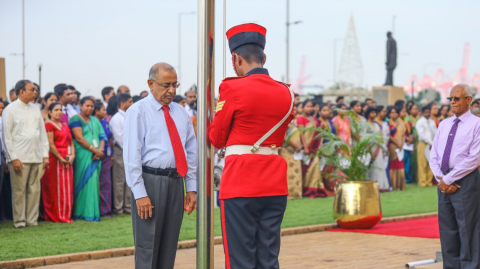
Secretary to the President, Dr. P.B. Jayasundera says all the public servants must honestly commit themselves to fulfill their respective duties in an efficient and productive manner in accordance with the ‘Rata Hadana Saubhagyaye Dekma’ of President Gotabaya Rajapaksa.
The Secretary to the President, addressing the staff of the Presidential Secretariat before the commencement of work for the New Year, at the Presidential Secretariat, today (01) said that the President has placed his firm confidence in the public service in the process of building the country.
The event commenced after the Secretary to the President hoisted the national flag followed by signing National Anthem. Two-minute silence was observed to commemorate war heroes who died in the conflict.
Later, all public officials took the oath pledging to work towards an efficient and productive public service.
The Secretary to the President stated that the prime objective of President Rajapaksa was to create efficient as well as people-friendly public service and further said that the President wished those who were in public service would render a service worth more than their salary.
‘The vision of President Gotabaya Rajapaksa is that the public service should not be a burden on the public. During the past the pledge given by the public servants limited only to a custom and as a result the public service degenerated into a service which is not appreciated by the people’. The Secretary to the President pointed out the importance of all the public servants fulfilling their respective duties in a manner that could eliminate the hatred among the people towards the public service.
‘A massive amount of money is spent on the public service. ‘Rata Hadana Saubhagyaye Dekma’, the policy manifesto of the President does not consider the public service as a burden. The aim of the President is to provide more benefits to the public through an efficient public service,’ Dr. Jayasundera said.
The Secretary to the President stressed the necessity of a new approach in the public service in order to build a democratic institutional system based on equality to create a people-centric country.
Mr. Lalith Weeratunga, Advisor to the President and the staff of the Presidential Secretariat participated on this occasion.
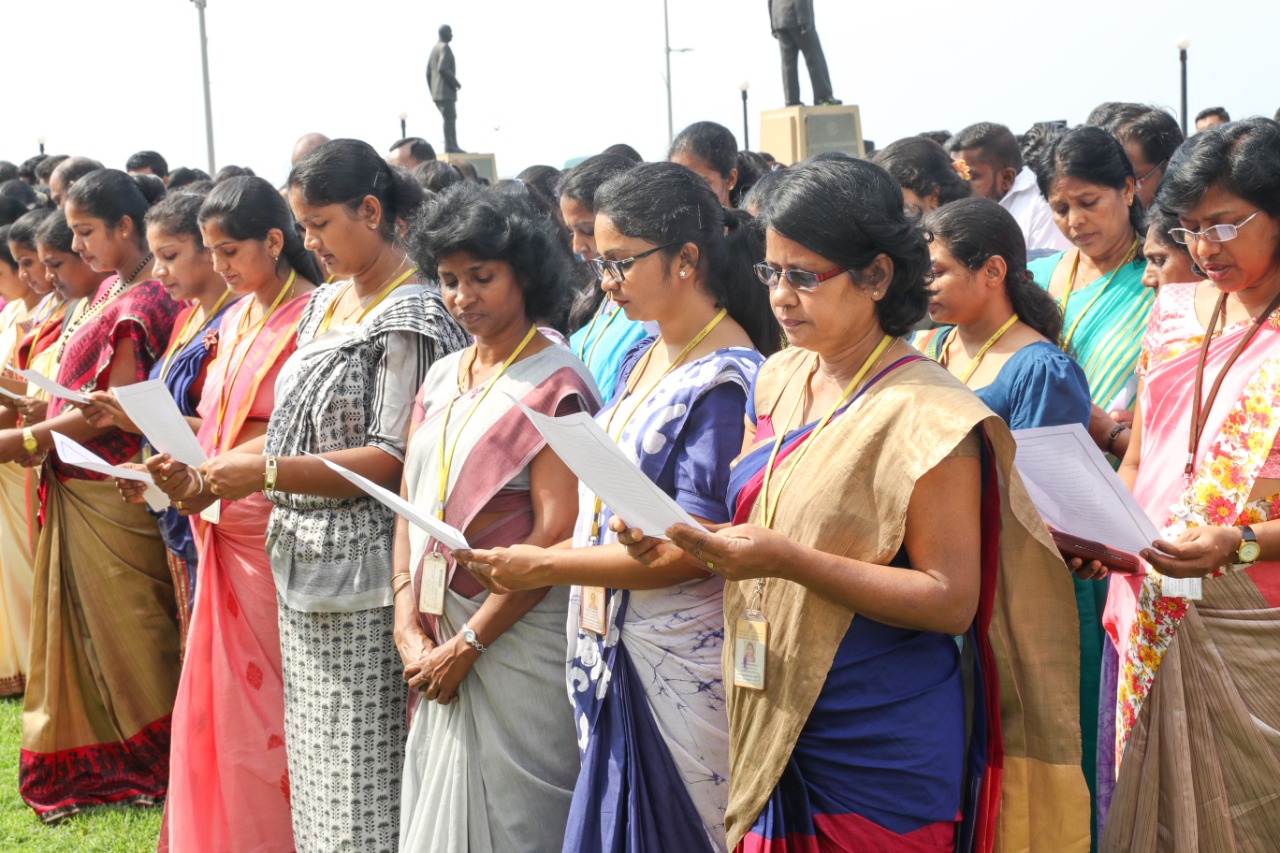
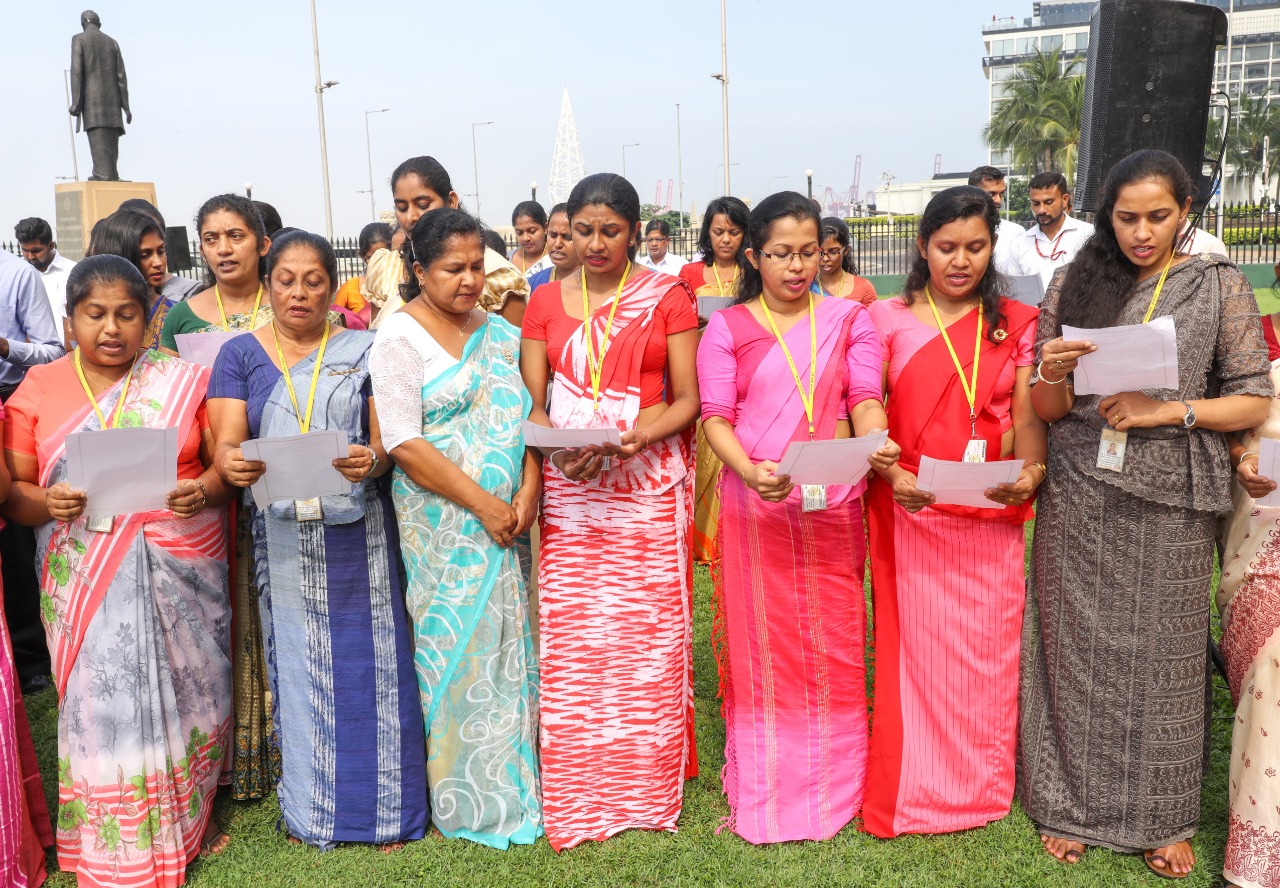
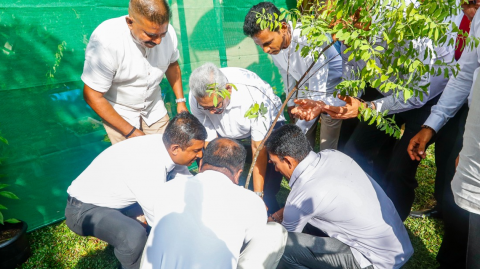
President Gotabaya Rajapaksa joined today (01) with the National Tree Planting Programme aimed at planting 1 million trees under the theme of “Hadena Ratata – Wadena Gasak” .
President Rajapaksa planting a sapling in the premises of his private residence in Mirihana extended his best wishes for the National Tree Planting Programme.
The National Tree Planting Programme aimed at planting 1 million trees across the country was launched in accordance with the environment policy outlined in President Gotabaya Rajapaksa’s election manifesto, to increase the forest cover of the country from 29%, to 32% within the next five years.


